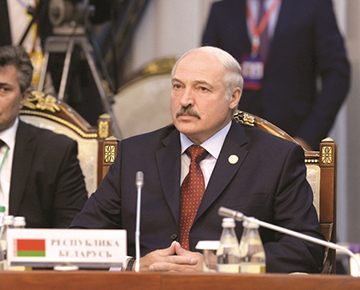The anniversary summit of the CIS Heads of State Council celebrates its success as well as more formal speeches and debates. Despite sceptics’ views on the ‘party atmosphere’ in Bishkek, substantial issues were debated. The 25th anniversary of the organisation was an occasion to analyse the activity and discuss the value and prospects of the CIS. All the participants were keen to both preserve the Commonwealth and develop it further, while considering how to improve aspects of its function.

Alexander Lukashenko at jubilee summit of CIS Heads of State Council in Bishkek
The presidents gave a great deal of attention to questions of optimisation of the CIS: both in respect of the apparatus structure, and in terms of the separation of competences. Not all the minor issues can be discussed by the heads of state, but more significant problems were certainly addressed by the supreme body of the CIS.
The idea of optimisation has been debated for some time, most importantly, all members require it to be to their advantage. Alexander Lukashenko expressed his view of the process, “Belarus initially proceeded from the view that personnel optimisation and toughening of financial discipline (which must be done of necessity) should not transform the CIS into a peripheral debating platform. We support the preservation of effective mechanisms for executing interstate decisions.”
One more theme for analysis is that the CIS also has functions which duplicate competences of the Eurasian Economic Union (EAEU) and the Collective Security Treaty Organisation (CSTO). Whether it is necessary to overload the Commonwealth with problems which are effectively solved by more advanced integration associations is an issue to be considered. The Belarusian position is as follows, “Concerning the topical question on the duplication of functions of the CIS and functions of EAEU and CSTO, it is necessary to recognise that the situation is really as described, but it is not right to take measures which could result in a decrease in the level of interaction with the countries which are not participants of the EAEU and CSTO... After all, within the limits of the CIS they perform certain tasks, and we have the opportunity at least to communicate with them...”
Minsk offers a model of reform which is used in Belarus in relation to any sphere. Its essence is simple: improve, without damaging the infrastructure of the organisation. As the President said, “We understand that the CIS if not reformed, should be brought to realise current issues. We should look at ourselves seriously, as well as at the organisation, and decide in what direction we will work to improve...”
Perhaps, one more major nuance, in which lies another well-known Belarusian approach: reform for the sake of its very process, will not be advantageous. It is necessary to aim reforms accurately. The CIS Heads of the State share the Belarusian view of the Commonwealth, described by Alexander Lukashenko, “Work on adaptation of the CIS to modern realities should be continued. And it should be conducted in the interests of the members. Transformation of the Commonwealth into a more attractive and influential structure in the international arena should become a priority.”
At the summit in Bishkek, the chairmanship of the CIS passed to the Russian Federation. It is natural that members of the organisation have high hopes for this period. Further development of the Commonwealth in many respects depends on Russia, as the largest player. The President of Belarus expressed, perhaps, the unanimous thoughts of his colleagues, “I will say frankly: we expect much from this chairmanship. I think that Russia finally will answer those questions which are being discussed today within the CIS...”
Vladimir Putin, in his speech, discussed the positive role of the CIS in times of great geopolitical changes after the USSR collapse. He reminded the members of how the Commonwealth helped post-Soviet countries to keep up close relations. He also said that he supports plans for optimisation of the organisation. Thus, Moscow takes up the functions of the leader, not only because of the rotation of the chairmanship but with definite aims in mind. It seems that the forthcoming year will be optimistic for the future destiny of the CIS and an increase of its authority.
By Vladimir Kharitonov











